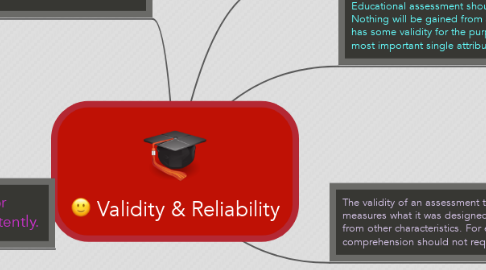Validity & Reliability
von Mayra Paola


1. Reliability: yield the same or similar score ranking consistently.
1.1. test-retest
1.2. alternate forms
1.3. internal consistency
1.4. test retest
2. Factors which can affect reliability:
2.1. The length of the assessment – a longer assessment generally produces more reliable results.
2.2. The suitability of the questions or tasks for the students being assessed.
2.3. The phrasing and terminology of the questions.
2.4. The consistency in test administration – for example, the length of time given for the assessment, instructions given to students before the test.
2.5. The readiness of students for the assessment – for example, a hot afternoon or straight after physical activity might not be the best time for students to be assessed.
2.6. The design of the marking schedule and moderation of marking procedures.
3. Validity: addresses the match between test questions and the content or subject area they are intended to assess.
3.1. Content Validity Evidence
3.2. Criterion-Related Validity Evidence
3.2.1. concurrent criterion-related validity
3.2.2. predictive validity
3.2.3. construct validity
